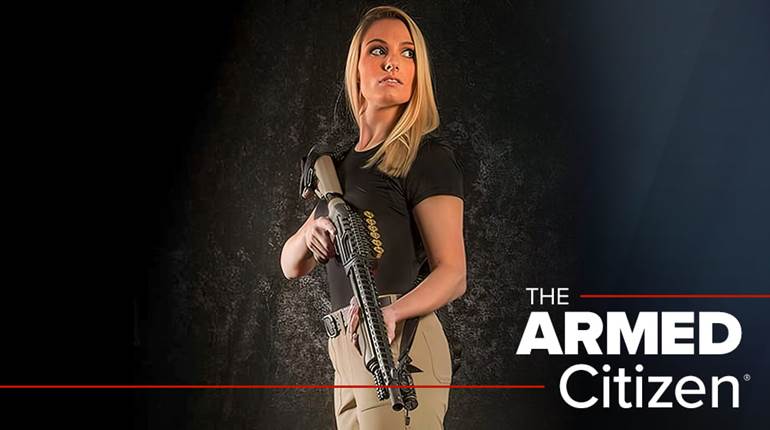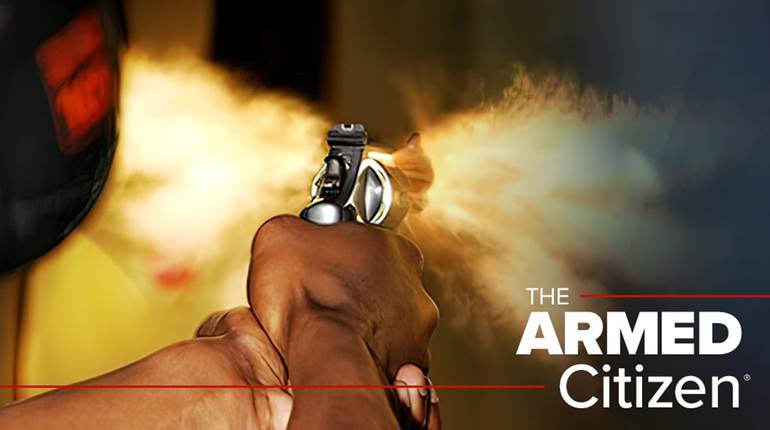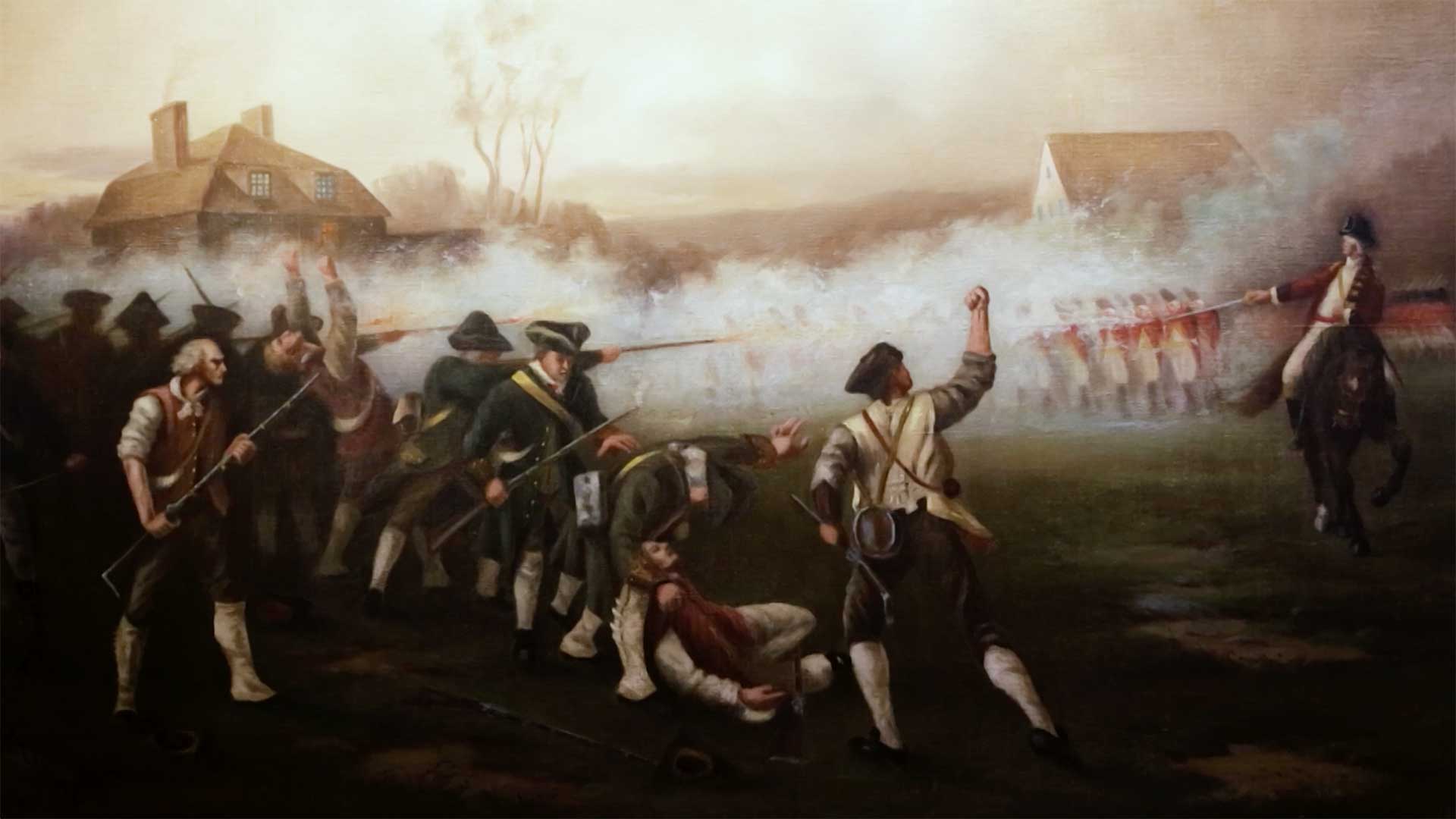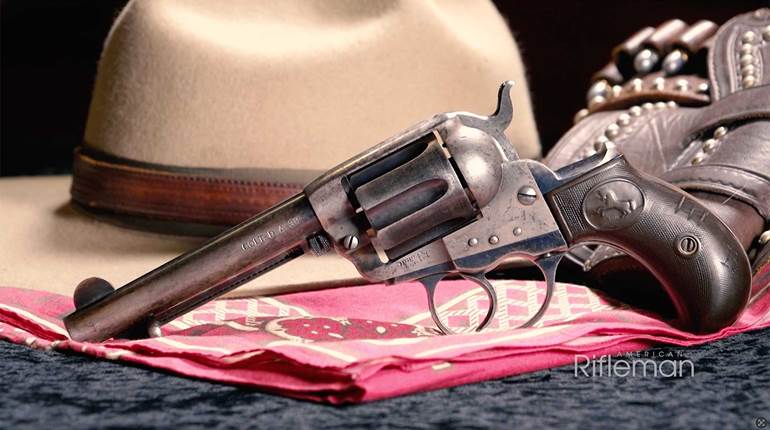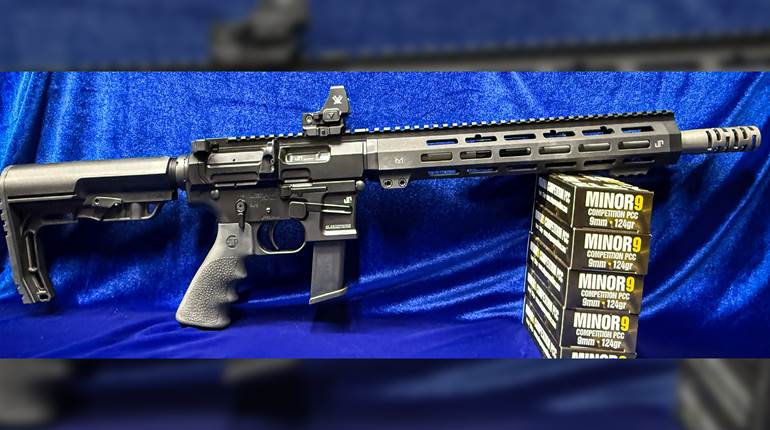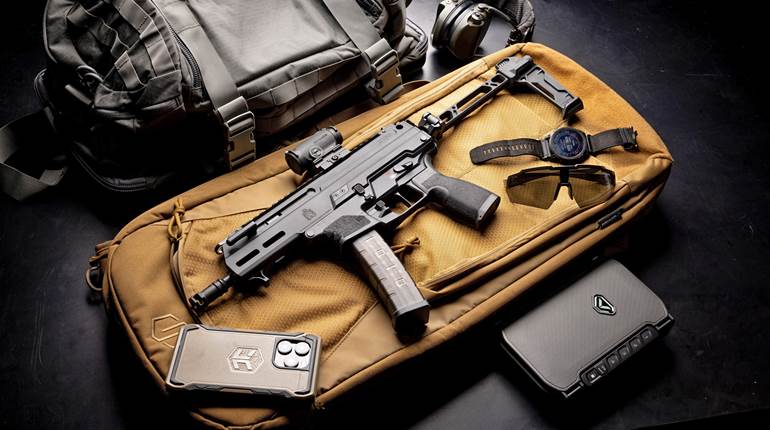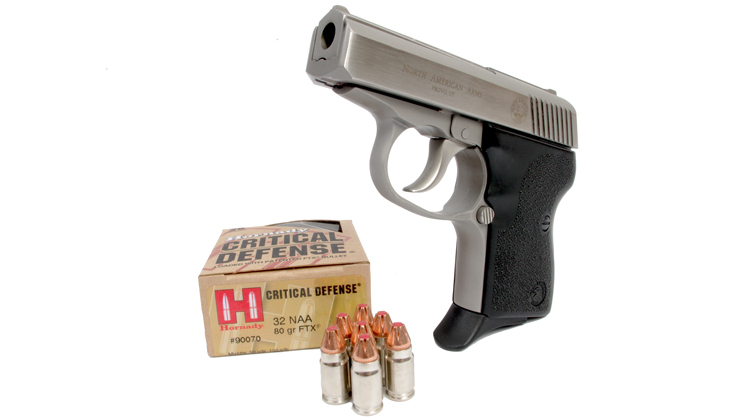
When the discussion turns to “pocket pistols” (that exceedingly popular family of handguns that caters to the CCW market), topics discussed inevitably move toward the considerations of the dimensions of the handgun being considered. “How small is it?”, “Can it actually fit into a normal-sized pocket?”, “How easy is it to draw?”, etc. However, these conversations touch on the topic of velocity much less often. And why would they? With the short, little stubby barrels of these semi-automatics and snubbie revolvers, trying to wring out a lot of velocity can be a fool’s errand. Apart from wrist-wrenching .357 Mag. snubbies, the most practical option is to try to get the largest-diameter projectile possible in your pocket gun and select some top-notch expanding ammo that will maximize on-target performance. Right? Maybe not. Thanks to the innovators at North American Arms (NAA), we have a very interesting alternative.
When I first mentioned North American Arms, your thoughts likely turned to the company’s popular series of pint-sized revolvers. Now, I know what you are thinking …. “A .22 Magnum might be pretty potent out of such a tiny wheelgun, but we are not talking about blistering ballistics here.” While I would agree with you that these little revolvers are indeed intriguing, I would point out that I am actually referring to NAA’s semi-automatic line of Guardian pistols. Featuring rugged stainless-steel construction, these SeeCamp-inspired pistols are offered in two sizes—a small-framed .32 ACP-sized model and a slightly larger .380 ACP-sized variant.

Both Guardian variants feature fixed-barrel, straight-blowback systems of operation (simple and reliable, but an admittedly somewhat bulky and heavy system when compared against other pocket pistols with locked-breech systems) and a double-action-only trigger system with a bobbed, exposed hammer. There is no manual safety, and the only controls on the pistol are basically the trigger and the frame-mounted, non-ambidextrous magazine release button. There is no slide catch as the slide does not lock back on an empty magazine.



Sights are made up of a tiny fixed set integral to the slide, with a notch rear and a blade front. The slide itself is open-topped and exposes the stainless-steel barrel that is affixed to the frame. Exceedingly old-school throughout, the Guardian also does not feature a magazine safety. It will fire a chambered round whether or not there is one of the stainless-steel magazines installed. Grips are a pair of black-rubber units with a subtle pebble texture and embossed with the NAA logo. All in all, a rock solid and attractive little pistol. 
Bottlenecked Rounds
I suspect at this point you are probably wondering what all this has to do with velocity, right? Yes, these are interesting little pocket guns, but the .32 ACP and the .380 ACP are not exactly barnstormers. Remember how I referred to the NAA crew as “innovators”? Well, we are getting to that now with this review of the .32 NAA Guardian pistol.

As noted earlier, you can acquire a Guardian chambered for the thoroughly capable (and commonly available) .32 ACP or .380 ACP rounds, but NAA has two other very unique options as well—the .25 NAA and the .32 NAA, and it is the latter of these we will be considering today. Both of these rounds, developed in concert with CorBon ammunition, feature “bottleneck” case designs. The .25 NAA is based off of the .32 ACP cartridge, is necked down to a .25-cal. projectile and is offered in the smaller-framed Guardian. The .32 NAA, offered in the larger .380 ACP-sized pistol, follows the same principle, but offers bigger punch and is based off of the .380 ACP case. Necked down to a .32-cal. projectile, the pint-sized powerhouse was designed to propel a 60-gr. projectile at 1,200 fps at the muzzle from the short 2.5” barrel of the Guardian, delivering 199 ft.-lbs. of energy.
To put that in perspective, a comparable .32 ACP defensive round would push a 60-gr. projectile at around 1,000 fps and have about 130 ft.-lbs. of energy at the muzzle. A comparable .380 ACP defensive round would push a 90-gr. projectile at 1,000 fps and produce about 200 ft.-lbs. of energy at the muzzle.
So, why exactly should you care? Well, bottlenecked pistol cartridges offer some notable advantages. Firstly, they will be far more likely to feed reliably in a pistol due to the much smaller size of the bullet versus the width of the case. Secondly, the increased velocity can result in improved on-target performance. During NAA’s research, they found that the .32 NAA could pass through four layers of denim and penetrate 8.3” deep into gelatin and expand on average to a .55” diameter.
But what are the disadvantages? On that topic, I can foresee your next question: “With performance not that far off from a good .380 ACP round, what is the point of this round?”. Fair question. The downsides to a round like the .32 NAA is limited ammo availability (in fact, CorBon has discontinued producing this ammo, leading me to acquire some excellent Hornady 80-gr. Critical Defense ammo for testing in its stead). Another downside is the relative similarity of the performance of the .32 NAA and the .380 ACP when it comes to ft.-lbs. of energy on target.
Look, sometimes we gun guys and gals just like something cool and different, and the .32 NAA definitely counts as that. I have always had a weakness for bottlenecked pistol rounds (from the 7.62x25 mm Tokarev round to the .357 SIG), and I like to try out guns and ammo that are a bit off-the-beaten-path sometimes. What is that saying, “variety is the spice of life”? So, if you are one of those types of shooters that likes things a little different, then the .32 NAA Guardian might be just the thing for you. Also, if you are looking to ramp up the velocity of the projectile from your pocket gun without trying to hang on to one of those .357 Mag. snubbie wheelgun beasts, this is a great option.
Hands On
I requested a test sample of the .32 NAA along with some Hornady 80-gr. Critical Defense ammo as well as a Versa Carry Pocket Holster in “Exotic Water Buffalo.” The pistol as tested came packed in a nice-looking white cardboard case that opened to reveal a key-locked steel handgun case. Nice. Opening the foam-lined case revealed the pistol and a spare magazine (one with a finger-extension baseplate and one with a flush one).

First impressions of the pistol were very good. The machining and finishing of the stainless-steel pistol appeared to be top notch. The flats of the slide featured an attractive polish as did the trigger and bobbed hammer, while the slide top and the frame sported a matte bead-blasted finish. The grips were smooth and comfortable, with the pebbled surface giving just the right amount of “bite” in the hand.
The other thing I noted when I first handled the pistol was its heft. At around 19 ozs. empty it is no heavyweight, but compared against all the polymer-framed .32 and .380 pistols out there today it is by no means a lightweight either. This thing just feels solid in the hand. To be frank, the heft of the pistol feeds into the “old school” vibe of this all-metal pistol and likely will not turn off the types of customers to which it will appeal.
As I mentioned above, as CorBon has discontinued its .25 and .32 NAA offerings, I selected Hornady’s 80-gr. Critical Defense load for testing. While it does not feature the blazing top speed of the CorBon 60-gr. loading, it is rated at 1,000 fps at the muzzle, and its 178 ft.-lbs. of energy is nothing to scoff at. I spent some time at home trying out the pistol in pocket-carry mode with the VersaCarry holster. To be frank, I expected it to be cumbersome considering that it weighs roughly twice as much as some of its .380 ACP competitors, but that was not the case. Its streamlined, rounded shape made it smoothly fit in and withdraw from my pocket, and the weight of it was barely noticeable. It drew cleanly from the VersaCarry holster, which remained solidly in my pocket during the draw. Although the flush magazine baseplate was better for pocket carry, I was even able to comfortably use the finger-extension magazine in the pistol for pocket carry without too much trouble.
Range Time
Next, it was time to take the pistol out to the range. Having never fired a Guardian or a .32 NAA, I was not quite sure what to expect. While handling the pistol prior to range time I did note that the force required to cycle the slide was notable. This is no doubt due to the straight blowback system (which relies on slide mass and spring resistance to keep the action closed long enough for chamber pressure to drop to safe levels before the action opens) and the rounded, small dimensions of the slide. This is not a pistol for those with weak hand strength.
I loaded up the six-round magazine of the pistol and began to run functioning drills with it. I soon discovered that it was having some trouble fully extracting a fired case and feeding the next round. As I have run into this with other tightly fitted compact pistols, I suspected the pistol might just need to “break-in.” This proved to be the case as the malfunctions (of which I had six), cleared up around the 75-round mark. The pistol ran perfectly for the rest of the testing.
I will say that the recoil of the .32 NAA round proved to be surprisingly manageable. I was expecting there to be some notable muzzle flip and blast, but it was downright pleasant. Whether this was due to the nature of the cartridge or the relatively heavy weight of 19 ozs. of the pistol, I cannot say. I will confess that I was also a bit apprehensive about the risk of “slide bite” due to the understated and rounded shape of the upper backstrap, but this concern proved to be unfounded.
The trigger pull of the pistol started out gritty with some stacking at the end, but it really smoothed out as the pistol was broken-in during testing. It measured around 10 lbs. on my trigger pull gauge, making this little pistol handle much like a double-action-only revolver. Once a round is chambered, the “safety” is the long, heavy trigger pull. Also of note is the fact the pistol does have a double-strike capability (although if you have a misfire in a defensive situation, your first action should be to clear the round and chamber another).
Accuracy of the pistol proved to be more than capable for its intended purpose. This is not a varmint gun, but rather a pistol meant to be carried concealed and used at close range. To that end, I ran my accuracy testing at 7 yards with the Hornady load and was able to get a smallest group of around 1.50”. At this stage in the testing (and past what appeared to be its “break-in”) the Guardian ran flawlessly.
Conclusion
So, do you need to get one of these pistols? As I noted above, this is a really unique pistol/chambering combination—and one that I believe appeals to a unique consumer. Can you get effective performance from a .380? Sure. Is the ammo cheaper? Yep. But if you want something a bit different, have tastes that lean toward that of a traditionalist (i.e., appreciating the charms of all-metal pistols) and have a weakness for bottlenecked pistol cartridges (I can see this pistol being paired as a back-up to a .357 SIG primary pistol for those with more esoteric tastes), then the .32 NAA Guardian deserves a close look from you.
Specifications
Manufacturer: North American Arms
Caliber: .32 NAA
Barrel: 2.5”
OA Length: 4.81”
Weight: 19 ozs. (empty)
Grips: Pebbled black rubber
Sights: Fixed notch rear, blade front
Action: Double-action-only
Finish: Stainless steel
Capacity: 6+1
MSRP: $456













